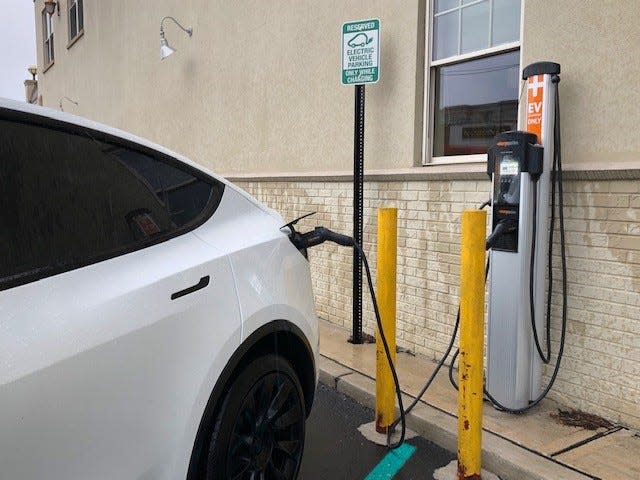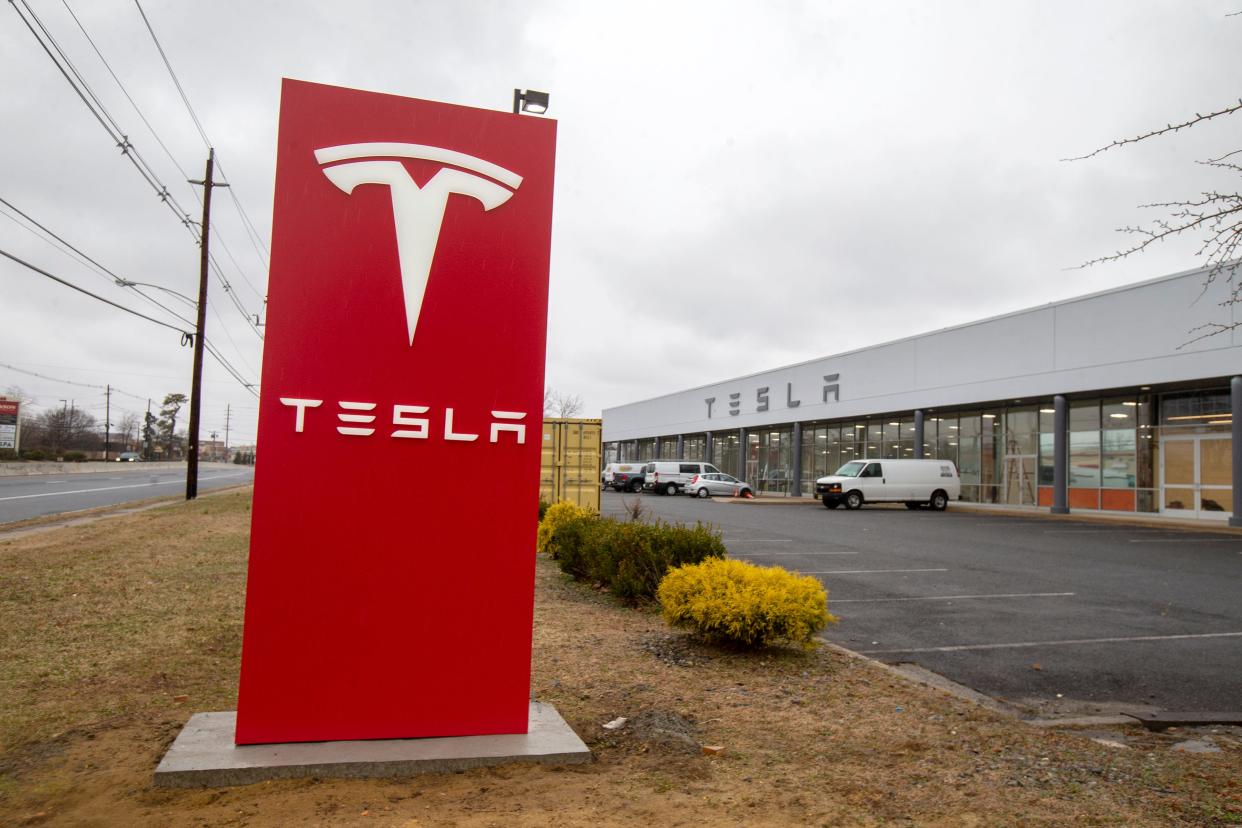Why New Jersey's electric vehicle mandate is stalling
Dave Bye of Eatontown wanted to buy an electric vehicle, but when his condo association refused to let him install a charger at his parking space or in any of their lots, his dreams drained like a dying battery.
Byer, 39, then tried the nearby train station where he parks for his commute to work. He said he was told there were no plans to install any chargers in the commuter lot.
Disappointed, but not completely deterred, Byer bought a plug-in hybrid, rather than the all-electric vehicle he originally hoped to purchase.
"It's definitely a step in the right direction," Byer said.
New Jersey officials have mandated that all new passenger vehicle sales – at least all those that weigh less than 8,500 pounds – be electric or plug-in electric hybrid by 2035. But significant challenges remain for those buyers who embrace electric.
Public charging options are limited. Experts say that New Jersey rebate programs for electric vehicle purchases are so popular, they dry up quickly. In addition, roughly half of the state's population say they have no plans to give up on gas-powered vehicles.

Why is NJ pushing for EVs?
New Jersey and 16 other states, led by California, have adopted all or part of what is known as the "Advance Clean Cars II" rules. The rules do not require New Jersey car buyers to purchase an electric vehicle, but the program is expected to spur production in the electric vehicle market and help support the expansion of existing charging infrastructure.
The goal is to push 100% of new vehicle sales of passenger vehicles, SUVs and light-weight trucks to be "zero emissions" by the year 2035. The program also adopts more stringent emissions standards for gas-powered cars and trucks. The reasoning is that transportation accounts for 37% of climate-altering pollution emissions in New Jersey, according to state officials.
"The steps we take today to lower emissions will improve air quality and mitigate climate impacts for generations to come, all while increasing access to cleaner car choices," Gov. Phil Murphy said in a statement in November. "Indeed, together with my Administration’s continuing investments in voluntary electric vehicle incentives, charging infrastructure, and the green economy, these new standards will preserve consumer choice and promote affordability for hardworking New Jerseyans across the state."

The Advance Clean Cars II mandate, as described by the California Air Resources Board, plans a phased-in approach where 35% of new vehicle sales in 2026 are electric or plug-in hybrid.
New Jersey has a long way to go to meet that standard within two years. Last year, less than 2% of cars and light-duty trucks on New Jersey roads were electric vehicles, according to data collected by the New Jersey Department of Environmental Protection.
Convincing more people to switch may prove more difficult than setting a state mandate. A recent poll from the Eagleton Center for Public Interest Polling at Rutgers University found that half of New Jersey residents did not support the electric vehicle mandate. Nearly half of respondents thought their finances would suffer because of the new rule.
"There is an intense layer of complexity to the issue," said Ashley Koning, an assistant research professor and director of the Rutgers-Eagleton Poll. "This is an issue…that is highly political and highly stigmatized and politically charged."
'The ocean gives so many gifts': This Rumson native is among USA TODAY's Women of the Year
People's acceptance or rejection of New Jersey's push toward electric vehicles follows political party lines, with 68% of New Jersey Democrats supporting the electric vehicle mandate. In contrast, only 15% of New Jersey Republicans support the measure.
"If we're adding up degrees of support and degrees of opposition, I'm seeing that New Jerseyans are really split right down the middle on this," Koning said.
EVs remain more expensive than gas-powered cars
One of the most significant obstacles to electric vehicle adoptions remains cost, say both supporters and critics. In general, electric vehicles remain more expensive than their gas-powered counterparts.
For example, an electric Hyundai Kona sells for roughly $8,000 more than its gas-powered version. The 2024 all-electric Prologue SUV from Honda has a MSRP about $7,000 higher than the price tag on the company's popular CR-V line.
Jim Appleton, president of the New Jersey Coalition of Automotive Retailers, or NJ CAR, said the cost difference can be prohibitive for many car buyers.
"The dealers are all-in on electric vehicles," Appleton said. "The manufacturers have spent hundreds of billions of dollars. The dealers in New Jersey alone have spent a couple hundred million dollars preparing to sell and service EVs. None of this is about what the dealers want."
New Jersey offers a $4,000 rebate for purchases and leases of new electric vehicles, Appleton said the state incentives are "on again, off again" and do not completely close the price gap.
Buyers can also take advantage of a $7,500 federal tax credit for buying certain electric vehicles. In addition, New Jersey does not collect sales tax on electric vehicles and offers a $250 rebate for installation of a home charger.
Another problem is that not all electric vehicles meet the standards to qualify for rebates, Appleton said.
"There's a great deal of interest on the part of consumers, shopping for an EV, but when it comes time to actually put their money down, they're not ready," Appleton said. "And it's not likely that they will be ready (or) in sync with the government mandates. This is causing a lot of concern among new car dealers and automakers."
Challenges to charging up EVs
While public sentiment remains an obstacle to electrifying New Jersey's transportation sector, another important challenge remains: installing an extensive network of chargers across the state.
Shane Skwarek, 38, of Stafford fell in love with driving electric, but when he and his wife bought his first EV, he faced a new challenge.
"I will be honest: we were mortified at the idea of charging this thing," said Skwarek. "Had we not had a supercharger at a Wawa maybe a mile from our house, we probably would have shied away from buying it."
A roughly 10-minute charge was all the vehicle needed, and with some planning for charging stops on longer trips, the car proved to be no problem, he said. Less than two years after buying the vehicle, Skwarek and his wife installed a charger at their home. Now they are considering buying a second EV.
Transportation: Gas tax hike — which would fund transit infrastructure — moves forward in NJ Senate
Skwarek said he will encourage anyone skeptical of an electric vehicle to give one a try.
"I've literally given my keys to them (for a test drive)," he said.
Across New Jersey, public access to EV chargers remains somewhat limited. There are 1,264 public EV charging ports for public use spread across 382 locations, according to the state Department of Environmental Protection. Of those, 70 locations were in Monmouth and Ocean counties.
Despite the limits, electric vehicles drivers can still manage long-distance travel, said Stanislav Jaracz, acting president of the New Jersey Electric Vehicle Association. Jaracz said he recently took his family of four to Orlando with his electric vehicle and some planning about charging stops.
"It's a hurdle, but it's still doable," he said.
Jaracz said people have not yet embraced electric vehicles because the technology is still somewhat new, but he expects that to change as EVs become more mainstream.
With "stackable" rebates and incentives from the federal and state government, electric vehicle costs are now more comparable to gas vehicle prices, he said.
"I think that with electric vehicles… When you hear from your peers, from your family, 'I have an electric car and I have no problem,' it's much more powerful than when they hear it from people like myself," he said.
Amanda Oglesby is an Ocean County native who covers education and the environment. She has worked for the Press for more than a decade. Reach her at @OglesbyAPP, aoglesby@gannettnj.com or 732-557-5701.
This article originally appeared on Asbury Park Press: Will NJ's EV mandate, rebates push car buyers to go electric?
